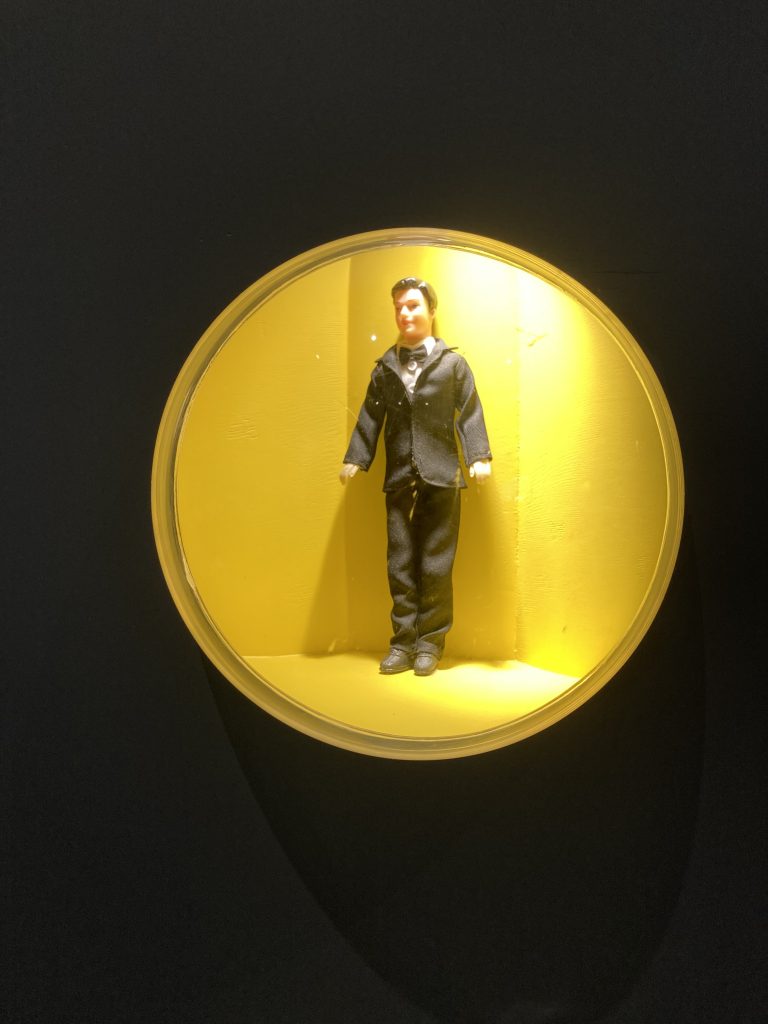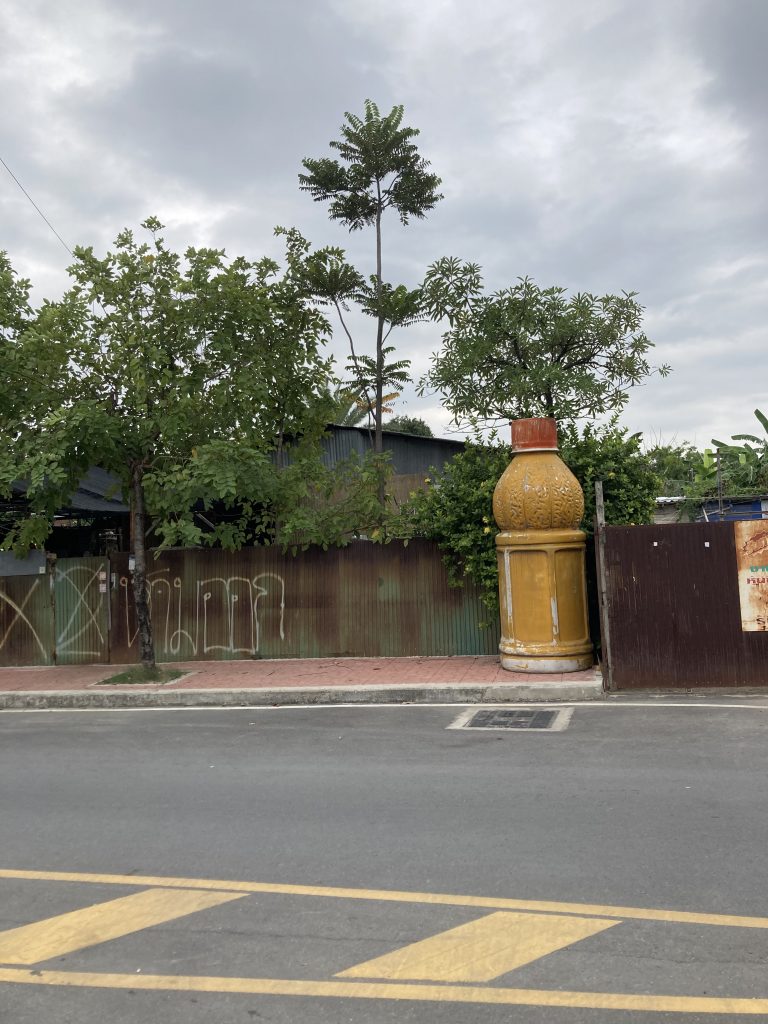
After a few weeks at ‘The Slim Vacancy,’ Hector and I eventually muster the energy to abandon our bed for the next lucky arrival. We don’t get far before the desolate ‘Nevadan Unemployment Center’ spills off ahead and to the west of the interstate. It’s early evening by the time we reach it- hardly dark but late enough that it doesn’t make sense to go any further. We pick a likely cubicle and, seeing the clouds gather, I unpack the tarp. Rain has already begun to fall by the time I finished the makeshift roof and slump into the cement likeness of a spinning office chair.
‘The Nevadan State Government’s manifestation of an ‘Unemployment Center’ suggests a cruel sense of humor and a severe lack of budget oversight. Though preliminary sketches of the facility are penned with such brutalism that one can’t help but assume it’s design is in jest, the project’s real world manifestation in 2006 did away with the playful artsy pretense and settled on something wholly brutal. Though someone had taken great care to model the cement likenesses of office equipment in each cubicle, the ‘Center’ was, and is, little more than a parking lot of cement outhouses baking in the sun off the interstate.
A series of PSAs aired shortly after work on ‘The Nevada Unemployment Center’ completed and these outlined the project’s simple offer: sit in these cubicles for eight hours a day and receive minimum wage. Humanitarian-based criticisms of the program are well-documented and can be perused elsewhere but most focus on that initial wave of enthusiastic participants. People from all over the state swarmed the cubicles and it soon became a thing all its own: half ironic artist retreat and legitimate tent city. When checks arrived two weeks later, a second wave of ‘employees’ appeared and demanded their turn. Violence followed, enough violence that the plan faced termination and ‘The Unemployment Center,’ a cement slab in the middle of nowhere, had to be fenced-off and guarded- a grand new tax-payer expense.
Interest in ‘The Nevada Unemployment Center’ soon waned and, criticisms aside, the oddball program may well have stabilized had it not been for the final blow. Following a tip from a small-town lawyer named Ricky Handler, all those initial ‘employees’ found they now qualified for severance and a revised unemployment package. A bill arrived somewhere at the statehouse and the guards disappeared overnight. ‘The Nevada Unemployment Center’ was abandoned, spiritually and otherwise. It remains abandoned to this day.
‘The Nevada Unemployment Center’ makes for a poor living space. It’s miles from the nearest town and provides little protection from the elements. It makes for a poor skate park- a poor background for the movers and shakers of modern social media. Nothing thrives there but snakes and tumbleweeds. It serves no real purpose but research suggests that, of all Nevada’s novelties, ‘The Unemployment Center’ will stand longer than just about anything else. If an alien shoe should step on the earth long after the human flame has been extinguished, they will know something of humanity and it will be the cubicle floor-plan of the early millennial office.’
I worked in a video shop when I was a teenager and spent the night there twice. The first time I was snowed in- I made microwave popcorn for dinner and waited out the storm. The second time was for some event- some late-night movie showing for which I never received overtime. Spending the night in a cubicle of ‘The Nevadan Unemployment Center’ reminds me of that place. Too formal to be a home. To familiar to be a business. I knew that store like the back of my hand and I didn’t mind, so much, stretching out on the floor and watching the snow fall. I didn’t mind, so much, catching glimpses of the night sky from the parking lot during that event- the crisp, midnight air. It’s like that, again, when the rain comes down onto the tarp. It’s like that when the wind flicks between the cubicles, rushing past our little shelter. Lightning flashes across the sky and I tell Hector we ought to unplug the cement computer, just in case. He blinks his cloudy eyes and finds a corner to relieve himself in.
A letter finds me two weeks later- something that hardly ever happens. It’s from Nevada and I think, for just a moment, that it might be a check. It’s a warning for trespassing: a generic cease-and-desist as though that little satisfaction might tempt me to return to that little box and to try to live out my life there.
-traveler
‘Off I-11 and not but an hour’s drive from Boulder City, Nevada there stands ‘The Slim Vacancy’ and its signage. The building itself is squat and cozy, made private via frosted glass rather than blackout shades or tinting. A smell like smoke lingers outside and low conversations are sometimes heard within. The sign stretches high above the horizon, buzzing red at dusk.
The single-page website for ‘The Slim Vacancy’ details only the exclusivity of the establishment and spares no words for the business’ purpose. Membership is based on a first come, first serve basis and is limited to just six members at a time. A neon sign indicates the current membership status and, as one might suspect, it reads ‘no vacancy’ more often than not.
Interest in ‘The Slim Vacancy’ waxes and wanes. Following its re-discovery, small crowds will sometimes gather in the lot and wait for an unlikely vacancy to occur. Nobody will stop visitors pressing their noses to the windows or their ears to the walls and nobody will response to loud knocks or calls for emergency evacuations. It’s said that the wood with which ‘The Slim Vacancy’ is constructed will stand up to fires and axe-blades, that the glass will bend but not break. It’s said that vacancies occur with no fanfare and, occasionally, with little indication of what may have been the catalyst. Of the 12 recorded vacancies, only five involved someone stepping out the door.’
If Shitholes’ author couldn’t get inside ‘The Slim Vacancy,’ I don’t hold out much hope for Hector or myself so imagine my surprise when the sign appears in the distance ahead and indicates a vacancy. I press the upper bounds of the speed limit but there’s no other traffic to speak of and no vehicles in the lot when I arrive. Just like that, my excitement becomes suspicion.
I keep Hector close as we reconnoiter the building, not entirely convinced that we won’t have to make a run for the entrance as soon as another car pulls off the interstate. Lights are on inside and, though a shadow passes by the frosted glass, it is absolutely quiet.
Several minutes tick by. I dither out front and tell myself that sometimes good things happen. Sometimes a man and his rabbit get lucky.
A squeal of tires breaks the spell. A car has swerved down the exit and aimed itself at ‘The Slim Vacancy.’ I scoop Hector from the ground, grab the bag from the bike and dash toward the building. I knock but get no answer. The door swings opens when I try the knob.
The growing engine noise is entirely blotted out by the door behind me. The inside of ‘The Slim Vacancy’ is stiflingly warm and it smells, nostalgically, of old cigarettes. A man’s head appears from a doorway. He’s leaned back in a wooden chair.
“Come on in,” he says.
‘The Slim Vacancy’ is a house, it turns out. A house with six small bedrooms. The man and two women are seated in a den, playing Graycards on an old pool table and drinking. The fridge is stocked with big-box staples and a dryer churns laundry near the back.
“Basement’s chock full’a stuff that won’t go bad,” the man, Brent, tells me, “And the owner comes around once in a while to replace things.”
Brent is a failed DJ. The women are sisters who claim to be ‘on the run.’ I ask about the Graycards and they say they found them on a shelf with several iterations of Monopoly. I ask about the owner and they all struggle to describe the person they’ve seen countless times.
“So what’s special about this place?” I ask.
“It’s free.”
The front door slams open and two more women hesitate on the threshold. I see the speeding car cooling off outside- their car. Like me, they seem thrown by the ease at which they’ve scored entry. The taller of the two steps forward.
“Is it… safe?”
I look around and shrug. “Yeah?”
“Yeah,” Brent confirms, “Sure. We’ll deal you in.”
At maximum capacity, ‘The Slim Vacancy’ seals itself off. Hannah, who has been inside for nearly a year, shows us a screen situated in the hallway closet that monitors several external cameras. On them, we see that the sign now indicates ‘no vacancy.’ The rest of the tour is simple. The three of us take bedrooms, all of which are more or less the same. Brent explains a complicated tap in one of the bathrooms and they all take turns confirming that ‘The Slim Vacancy’ is basically a comfortable place to squat as long as there’s a spot open.
“I was here a few years ago,” Brent recalls, “Vibe was different, then. A real party house. This guy, Devon, decides he’s going to make a beer run because he’s had enough of the house stuff and, just a minute after he’s gone, a guy named Arnie pulls of the road and takes his place.”
“Why’d you leave the first time?”
“Arnie was a real drag.”
The three long-term residents have already eaten but they offer us some cold pizza and a round of drinks. After a muted ‘cheers’ the six of us head off to bed. The room is comfortable and quiet. Hector falls asleep in his kennel and I doze off a little while later.
Sun filters through the frosted glass in the morning and the smell of frying bacon creeps under the door. I rest, for a while, and as soon as I consider that this is the sort of place that grows on a person- the sort of place that threatens my travel- a silhouette passes outside and a wild possessiveness clenches my chest. Leaving means giving up my spot and I’m not ready to spurn luck so soon.
Brent is tapping at the monitor when I peer out of the room. He’s got an apron on and a spatula in his hand and he looks relieved to see me.
“Would you watch this for a moment?” he asks, “I gotta flip the pork.”
A man is pacing outside. He stops and looks up- waves in the general direction of the camera. It occurs to me that he’s been inside before.
“That’s Arnie,” Brent says, back from the kitchen, “Lucky you three showed up when you did or we’d be stuck with him again.”
“I don’t plan on staying long,” I warn him, “I’ve got some work to do.”
“Tell you what, buddy. You wait Arnie out a week and I’ll cook you and your rabbit a week’s worth of breakfasts. Whatever you’re doin,’ it can’t be so urgent you didn’t keep you from spending the night on the fly.”
Hector, still clumsy with sleep, hops from the bedroom and a comfortable lethargy stirs in my chest.
“One week,” I tell him, “And if Arnie’s still here after that, it’s your tough luck.”
-traveler
Hector’s willingness to engage in travel is admirable for a blind, naked rabbit, so it’s difficult to be frustrated when I discover he’s adverse to climbing uphill for more than a few moments at a time. The check-up Hector received early in our acquaintance suggested he’s enjoying the upper-middle age of a rabbit’s lifespan. He seems healthy enough but the hardships of his life have been weathered with stoicism alone. The creature is entirely unwilling to explore the more athletic forms of endurance this late in life and a certain world-weariness may have something to do with it.
All to say that I climb Bagger Hill with Hector strapped to my chest, looking like an alien parasite in a modified baby sling. If it were a day hike I might have considered leaving him behind in the kennel, strapped to the bike and covered against wind, rain, and predators. Hector is quiet, by default, and the trailhead is well enough off the beaten path that I doubt anybody would have been in a position to steal him or to question his abandonment. Sources say the trail to ‘The Y2Kave’ takes at least two days- and that’s quickly paced. I, like Hector, have slowed down, some. I plan for three days and pack for four. Toss a rabbit’s weight on top and you have a slow hike indeed.
‘It’s common enough to find oneself nostalgic for the simpler sort of apocalypse that Y2K embodied. Imagine humanity’s unraveling, not at the hands of some insidious nuclear power or by means of plotting and coups, but as a result of simple short-sidedness in the creation of its digital calendar systems. Imagine the collective grimace- the flashing double-zeroes on screens across the globe as planes fell from the sky and microwaves silenced and the streetlamps all went out. Imagine it happened at midnight- a great wave of darkness opposite the sun, revelers frozen with their champagne. Awake, as one might be during a plague. Surprised, as one might be by an atomic blast. Alive enough to be afraid.
Alabama’s ‘Y2Kave’ is a bit of a time capsule in that regard. It is the site chosen by a group of 20-something pessimists for their final days on earth, a tribute to a night of hedonism and paranoia. ‘The Y2Kave’ is far enough off the beaten path that it has been spared defacement. Animals find the place repugnant for some reason, perhaps the residual paint fumes or the unnatural coloring of the walls.
The small cave has become an unlikely respite from the modern world- but a temporary one. The dawn of the century was, by no means, an age of absolute contentment. ‘The Y2Kave’ is the product of fear- naïve fear, perhaps, but fear just the same. Few stay for longer than a week before the place’s subtle haunting drives them away.’
Hector and I reach the cave late in the afternoon, having overshot the turnoff half a mile before catching the mistake. I’m happy to find ‘The Y2Kave’ vacant. My sense is that visitors tend to be meditative rather that rowdy but I don’t savor the possibility of having to commiserate over the state of the world. Things are obviously bad. Let me suffer alone.
Hector is asleep when I set him down in the sling. He opens an eye when I reattach his harness and closes it again once I stand. I let him rest and step into the cave.
Shitholes doesn’t mention that some amount of purposeful conservation has occurred at the site of this ancient doomsday party. Empty bottles of discontinued wine coolers have been organized along one wall. Scraps of paper have been patched together and anchored by rocks. Several other items- a frisbee, a joint, a pack of Camels, a pair of glasses- have been inventoried in the back where visitors have identified them in chalk. Two halves of a Y2K emergency pamphlet have been rolled up and pressed into a wine bottle. It reeks of late-nineties graphic design, all 3D fonts and clipart despite the dire warnings.
A controversial timeline of the party itself has been laid out on another wall, this also in chalk. The anonymous attendees of the original party seemed to have begun a mural early in the night- a visual depiction of human civilization from the beginning of time. The mural is largely western, beginning with a satirical depiction of Adam and Eve, leading into vague scenes of Egypt and possibly China, and slowing down once more for the founding of the US. To their credit, the artists had a pretty good memory of the past centuries’ American atrocities and less-satirical depictions of those events take up much of the remaining space.
The chalk timeline notes the drunken sloppiness of the painting as the timeline reaches 2000, at which point there is an unfinished sketch of the party itself followed by a couple dozen doomsday scenarios. Everything from nuclear war to alien invasion.
There is some internet chatter about a jutting rock near the end of the mural where paint has dried dark brown. Some suggest the party ended in violence, when drawn-out paranoia overcame the nihilism. The inclusion of twenty-odd cans of food and a rusted pot in the inventory suggests the potential for a longer stay- a half-hearted shelter for the early days of the end times. It doesn’t take much for humans to turn over so few resources.
I bring Hector into the cave a little later to see if he has a sense for the place. He hops here and there and he pauses briefly to lick at the bloody rock before I pull him away. After the novelty has faded he, like other animals, seems to be in favor of spending the evening outside.
It’s a clear night, and not so cold for mid-autumn. We sleep under the stars and pack up early the next morning. We make better time on the way down and are soon cast back into the troubled present, eased not by the respite itself, but for having recognized the futility of dwelling overlong in the past.
-traveler
‘It’s impossible to deny that small town America is made of denser earth than its cities, complicated as they are by sewage, subways, and secret means of egress for the billionaire elite. Small towns exert gravity such that passing vehicles slingshot by, hurriedly propelled between coasts. Long-time residents find their homes difficult to leave, weighted, as they are, by generational inertia.
The frequency of ‘Runaway Truck Ramps’ in rural America represents the nation’s half-hearted solution- a system that, in theory, would funnel the collected energy of a truckful of runaways into a single attempt to break from a small town’s orbit. Those who try to avail this service quickly realize the truth of the matter. Funding for the ramps fell through just months after construction began. Hopeful runaways will find that most are nothing more than hard-earned dead ends.’
Though Shitholes is right to warn against staking one’s escape on a random ‘Runaway Truck Ramp,’ a handful did make it to a later stage of construction before being de-funded. They aren’t complete by any stretch of the word. They aren’t particularly safe. They aren’t even particularly well-placed but their functionality is enough that travelers’ havens tend to spring up nearby. Hector and I spend a week near the lake at Pearl City and we let ourselves grow comfortable with the idea of staying put for a while.
When it’s time to leave, we take the ramp and find that leaving isn’t so hard after all.
-traveler
‘Though it goes by many names and leads in several directions, most agree that ‘The Sharp Right’ is a single phenomenon manifesting in multiple ways. The overall illusion is always the same- the sudden arrival of a traveler’s exit several miles before expected. Some describe ‘The Sharp Right’ as insidiously mundane. Others recall its exaggerated signage, something they only recognize after the fact. Massive signs. Flashing lights and warnings. The inclusion of exclamation points and underlines. Whatever it takes to force the driver into a sudden, panicked turn.
Of course, once the driver turns, ‘The Sharp Right’ disappears, giving way to whatever should be there on the shoulder of the interstate- a tree, a barrier, a precipice, or just enough of a slope to start the vehicle rolling.
The frequency of ‘The Sharp Right’ is difficult to track for the fact that the majority of its survivors will never understand that their lives were threatened. A moment’s hesitation will have saved them and, though it may prove disorienting to find the true exit where it should be, most will chalk it up to exhaustion. The only lasting evidence of ‘The Sharp Right’ is the skid marks one sometimes sees veering right on a perfectly straight stretch of road- a trail of broken glass. A twisted traffic barrier.
‘The Sharp Right’ is among the few of the Wayside’s legally recognized oddities, it being a ‘hail mary’ for the wealthy drunk driver. As of publication there are no reliable means by which is can be detected or warded against. A traveler can only be advised to remain attentive, and to trust their intuition, even if their intuition takes them a little out of the way.’
-an excerpt, Autumn by the Wayside
Rear View Mirror
- July 2025
- June 2025
- May 2025
- April 2025
- March 2025
- February 2025
- January 2025
- December 2024
- November 2024
- October 2024
- September 2024
- August 2024
- July 2024
- June 2024
- May 2024
- April 2024
- March 2024
- February 2024
- January 2024
- December 2023
- November 2023
- October 2023
- September 2023
- August 2023
- July 2023
- June 2023
- May 2023
- April 2023
- March 2023
- February 2023
- January 2023
- December 2022
- November 2022
- October 2022
- September 2022
- August 2022
- July 2022
- June 2022
- May 2022
- April 2022
- March 2022
- February 2022
- January 2022
- December 2021
- November 2021
- October 2021
- September 2021
- August 2021
- July 2021
- June 2021
- May 2021
- April 2021
- March 2021
- February 2021
- January 2021
- December 2020
- November 2020
- October 2020
- September 2020
- August 2020
- July 2020
- June 2020
- May 2020
- April 2020
- March 2020
- February 2020
- January 2020
- December 2019
- November 2019
- October 2019
- September 2019
- August 2019
- July 2019
- June 2019
- May 2019
- April 2019
- March 2019
- February 2019
- January 2019
- December 2018
- November 2018
- October 2018
- September 2018
- August 2018
- July 2018
- June 2018
- May 2018
- April 2018
- March 2018
- February 2018
- January 2018
- December 2017
- November 2017
- October 2017
- September 2017
- August 2017
- July 2017
- June 2017
- May 2017
- April 2017
- March 2017
- February 2017
- January 2017
- December 2016
- November 2016
- October 2016
- September 2016
- August 2016




